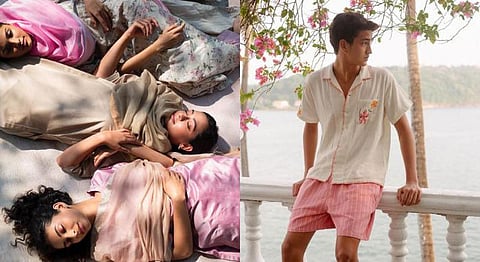
- HOMEGROWN WORLD
- #HGCREATORS
- #HGEXPLORE
- #HGVOICES
- #HGSHOP
- CAREERS
- ABOUT US
- CONTACT US

Slow and sustainable fashion has been the widespread opposition to a growing fast fashion industry. The term was first coined by author, design activist, and professor Kate Fletcher. It is the intentional and thoughtful consumption of garments, created by sustainable fabrics and methods. Slower production, small-batch collections, and clean and classic designs are the way forward, according to the slow fashion movement. Though the prices are on the higher side, you pay a premium for one-of-a-kind designs, as well as saving the planet from endless landfill dumping.
Slow fashion is not a new movement in India. For decades, our mothers and grandmothers have been getting their clothes tailored, especially before the rise of ready-to-wear shops and fashions in India. My mother, who grew up in Jamnagar in Gujarat, only bought her first pair of jeans in 1990 and wore them for the next few years until I was born.
But since then, we have seen the rise of fast fashion and the launch of megalith stores Zara and H&M in India. Now, smaller fashion start-ups with a keen eye for design and sustainability are making their mark on the fashion industry in India and abroad, and creating a name for Indian design using local artisans and fabrics.
I. Hut Mentality
Launched by Netflix star Isha Punja, US-based Hut Mentality is a bespoke slow fashion brand shining a light on Indian artisans from the Raan of Kutch, with colourful, exquisitely embroidered clothes with a western flair. The hand-embroidered corset tops with their trademark dramatic sleeves give back to the lost art of Indian handloom, using textiles and crafts that have been passed down through several generations of artisans. Produced in small batches, there are imperfections and differences in each piece, making them human and completely unique.
Follow them here.
II. Harago
Jaipur-based label Harago was launched in 2019 by Symbiosis-alum Harsh Agarwal. Primarily a menswear label, Harago was crafted keeping in mind ancient textile techniques and cultural craftsmanship. With lightweight genderless button-downs and shorts made from breezy materials, the brand has been seen on celebrities galore, from Drake to Harry Styles. Rather than calling his brand sustainable, Agarwal refers to it as a craftsmanship-based label, reviving ancient craft techniques such as the Sujini running stitch technique of Bihar. Available on major e-tailers like Ssense and MATCHESFASHION, Harago is making a huge splash as an up-and-coming Indian menswear brand.
Follow them here.
III. Eka
Rooted in a culture of simple living, Eka founder Rina Singh’s motivations to create the brand were centred on her love for people, nature, and craft. Her Indian wear promotes an ethos of comfortable, lived-in staples made of natural fibre that surpass seasons, age, cultures and shapes. Ekà, which means ‘one’ in Sanskrit, is inspired by the pastoral pleasures in our country, with fluid cuts and natural fabrics with thoughtful details giving it a personal and timeless touch. Meant to be worn for a lifetime, Eka is designed from start to finish with reflective technical know-how and craft processes using hand block printing and tailored jacquard weaves.
Follow them here.
IV. Anavila
As written in the brand’s Instagram bio, “mindful creation leads to mindful consumption.” Designer Anavila Misra is famous for her gorgeous handwoven linen saris, giving them a minimalistic twist, perfect for the modern Indian woman. Misra works with weavers from Phulia, West Bengal, creating luxury saris using a blend of linen and zari, as well as motifs like hand-blocked prints, plaid, and stripes. With printers in Gujarat, batik artisans in Bengal and Khatwa artisans in Jharkhand, one sari takes around 15-60 days to create, a process that is worth waiting for after seeing the final product. For Misra, mindful consumption is knowing where her clothes came from, and who made them — as well as creating a wardrobe that is classic and timeless.
Follow them here.
If you enjoyed reading this, we also suggest:
